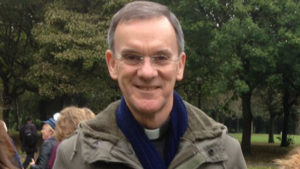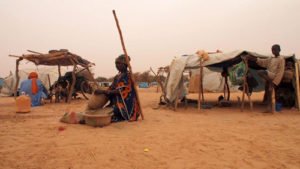Bishop John’s last couple of days in Niger
Bishop John Arnold, CAFOD’s Chair of Trustees, has now returned from visiting Niger. He visited CAFOD partners there and our Hands On Doutchi project. Read more about this trip here.

Hands On is a special series of CAFOD projects that allows you to support a specific community with a project. Our latest project in Bolivia is still open for new supporters to join.
Day five – return to the city
Today was the long journey back to the capital city of Niamey. The journey was certainly long but by no means tedious and I keep reminding myself of the privilege of being here and experiencing the life of the people and a place which could not be much further removed from life in Manchester.
And it is different from any other country that I have been to on this continent. The dominant presence of Islam affects every aspect of life. Even the bright and flowing clothing of the people is very different from other African countries. The Nigeriens are a tall and slim people and their robes are elegant.
The sights along the road repeated themselves. In the early morning, there were the frequent sights of the women gathered at the boreholes and pumping the water into bright yellow plastic containers and taking it away using a shoulder yoke or carrying it on their heads. They are often accompanied by toddlers or babies that they carry on their backs.
We arrived back at the hotel and had a couple of hours of free time. In the hotel gift shop, I met a Dutch Little Sister of Jesus, serving behind the counter. She told us that she had been in Niger for 32 years. Until recently she had lived with the nomads in the desert and loved it. But the infiltrations of Boko Haram had meant that the Sisters had to move to the city. She now lives with two other Sisters. She works in the hotel for three days a week to earn enough money to pay rent and spends the rest of her time visiting anyone in need and the two prisons where she says conditions are appalling. She takes beads into the prison for the prisoners to make necklaces and jewellery which makes their lives inside a little more bearable. She also visits the families of the prisoners. What a wonderful lady.

In Niger, we work with two partners to support refugees, including those families who have fled violence due to Boko Haram infiltrations, providing food, health care and essential items like hygiene kits and mosquito nets.
Later in the evening, Mass was very lively. African liturgy is unique. For me, the star was a very serene drummer who managed to get all sorts of sounds out of his drum and he also had a beautiful tenor voice. We then went to the Archbishop’s House for supper. He told us how he was a Muslim and baptised at the age of 22. He was ordained at 30 and ordained archbishop at 47. He is the first native of Niger to be a bishop. He sees his main priority to be reclaiming young adults. So we share that concern. He admitted that the burning of the churches after Charlie Hebdo had frightened him and he nearly lost the Cathedral at the time. Though it is hard to predict the extremists, he is confident that relations with the Muslims are ever better.
We have a slightly later start tomorrow and are not leaving until 8 am. I shall make the most of it.
Day six – final visit to another project
Today, we drove just 40kms away from the city, to another. The level of poverty here was shocking, particularly given its proximity to the capital. What must other communities be facing another 1,000 kms away?
The project here is in partnership with a non-religious group. We arrived at a fenced field of about half an acre. This is worked by 150 women who produce enough food for their families, with some to sell at the market. The agricultural practices that they have learned mean they can grow various vegetables all year round rather than just seasonal crops. There had long been a well there. This had required hand-drawn water and there were two logs there with deep grooves where the ropes for drawing the water had worn them away. Now the water is drawn by electricity supplied by a small solar panel on the roof of a hut, which contained the transformer. It has revolutionised the lives of over one hundred families. The half-acre is networked by hosepipes which give a constant drip feed of water to the plants that grow rapidly.
We also visited the school, which is entirely made up of two straw huts probably no more than 20 feet square each. Over 20 children were in each hut. There was a single blackboard but no desks or chairs. A couple of number and letter charts were written on old cardboard boxes. The children sat on mats on the sand floor. But they were delightful and clearly eager to learn. Every question was met with a flurry of hands in the air to respond. Outside the huts were their shoes strewn across the sand floor. There were no other facilities.
We returned to the CAFOD office in the city and met with CRS, the American Caritas and then the Ministry of Community Development. There was a good sense that the work of CAFOD is welcome and having an impact.
It has been a privilege to visit Niger and I have felt very welcome among this graceful and dignified people. But the horrors of poverty are all too evident. And I know that as always after a CAFOD trip, I shall find myself feeling very uncomfortable with the waste and consumption at home.
There is an abiding joy here, despite the deprivation and the need to live each day as best one can. The resilience is clear and the two Masses I have concelebrated show a determination to survive and develop.